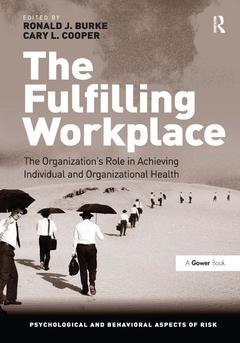The Fulfilling Workplace The Organization's Role in Achieving Individual and Organizational Health Psychological and Behavioural Aspects of Risk Series
Auteur : Burke Ronald J.
Coordonnateur : Cooper Cary L.

Ronald Burke's work has focused on the relationship between the work environment and individual and organizational health. He was Founding Editor of the Canadian Journal of Administrative Sciences and has served on editorial boards of more than a dozen journals. He has served as Director of the PhD Program at Schulich School of Business, York University, Toronto, and as Associate Dean for Research. Cary L. Cooper, CBE, is Distinguished Professor of Organizational Psychology and Health, Lancaster University, England. He is Founding Editor of the Journal of Organizational Behavior and Editor in Chief of the medical journal Stress & Health. He is Fellow of the Academy of Management, Honorary Fellow of the British Psychological Society and of the Royal College of Physicians. He is currently Chair of the Academy of Social Sciences. In 2001, Cary was awarded a CBE by the Queen for his contribution to organizational health. He was the lead scientist on the UK government’s Foresight project on Mental Capital and Wellbeing.
Date de parution : 04-2013
17.4x24.6 cm
Date de parution : 11-2016
17.4x24.6 cm
Thèmes de The Fulfilling Workplace :
Mots-clés :
engagement; job; resources; counter-productive; behavior; crafting; intrinsic; motivation; organizational; citizenship; John Henryism; Health Risk Assessments; Foster Work Engagement; Emotional Exhaustion; Dispositional Goal Orientation; Vice Versa; Ethical Corporate Culture; Safety Climate; Positive Safety Climate; Self-reported Cognitive Failure; Safety Climate Perceptions; Low Burnout Scores; Corporate Wellness Program; Work Engagement; Job Resources; Employee Engagement; Personal Development; Sexual Harassment Training; Core Ethical Values; Von Dem Knesebeck; Job Crafting; Ceo’s Statement; MIT Sloan Management Review; Person Organization Fit; Report Problem Drinking



